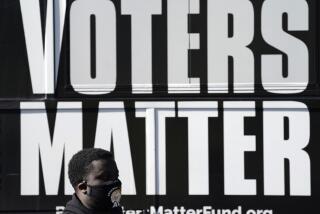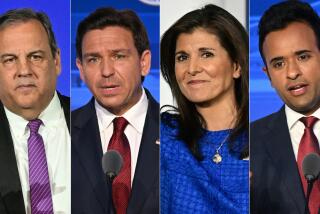Gore Finds Support in South With Strong Stand on Defense
- Share via
BIRMINGHAM, Ala. — Democratic presidential candidate Sen. Albert Gore Jr. still travels coach class on commercial airlines as he campaigns, carries his own luggage and goes unrecognized as he darts through countless airports.
Yet here in the South, at least, the obscure frequent flyer from Tennessee seems on the verge of winning the political equivalent of a first-class upgrade for his fledgling candidacy.
“He’s making a strong move in Alabama right now,” says John Baker, chairman of the Alabama Democratic Party. “There has been significant movement towards Gore in the state in the last 10 days.”
“I’ve run four statewide campaigns here myself, so I have a feel for when there is momentum--and right now I feel a strong groundswell in Alabama for Gore,” adds Alabama Lt. Gov. Jim Folsom Jr., who endorsed Gore last week.
Indeed, after months of running at the heels of his better-known Democratic rivals, the 39-year-old Tennessee senator has suddenly burst into the limelight on the strength of a wave of support from Democrats all across his home region.
Debate Showings
Gore’s new Southern surge has been sparked largely by his performances in a series of recent televised debates among the Democratic candidates, forums that he has successfully used to distance himself from his more liberal rivals on national security and defense issues in order to appeal to white Southern voters.
By staking out moderate positions on a range of foreign policy and military matters, while at the same time blasting what he depicts as the very liberal positions of his rivals, Gore has emerged from the debates looking like the only hawk in the Democratic field.
Gore likes to say that makes him the most electable Democrat, a major selling point in a party that has won only one of the last five presidential elections. “I have aimed my campaign message at Democrats who believe themselves to be realists, and who look at issues one by one without applying ideological tests,” Gore says. “The receptivity to that message is greater this year than ever before, both in the South and across the country, simply because there is such an intense desire among Democrats to win.”
Coupled with the fact that he is the only Southerner in the race, Gore’s hard-line rhetoric has given him a new allure in the South, especially among local party leaders and wealthy fund-raisers in the region who had previously delayed committing to any candidate in the hope that Sen. Sam Nunn of Georgia, the party’s leading expert on defense matters, would enter the race.
Here in Alabama, for instance, where Gore is mounting an intensive campaign, his tough talk has struck an especially responsive chord.
“I started being on Gore’s team when the rest of the field left us out in left field on defense and foreign policy,” says Earl Goodwin, a powerful Alabama state senator from Selma. “I’m a conservative, and I consider him a conservative. We all better start kissing that flag again. We’ve got to have a candidate who is going to listen to these kinds of things.”
Gore is hoping to use such conservative support to take full advantage of the 1988 political calendar, which is designed to give Southern voters a bigger say in choosing the Democratic presidential nominee. The advent of what amounts to a Southern regional primary on Super Tuesday, March 8--right after the first contests in Iowa and New Hampshire--has handed native-son Gore an opportunity to gain national visibility early in the race by appealing to the South’s traditional support for a strong military.
Not That Far Right
Still, Gore’s stands on the major defense and foreign policy questions of the day are not all that far to the right of the other Democrats. He opposes military aid to the Nicaraguan Contras, for instance, supports the War Powers Act and continued observance of the ABM and Salt II nuclear arms treaties and is against an early deployment of a “Star Wars” space defense shield.
He differs from the rest of the field mainly in areas where his rivals’ more liberal positions seem to have less popular support. He rejects a total ban on ballistic missile flight tests, supports humanitarian aid for the Contras under the terms of the Arias peace plan, backs the use of the U.S. Navy in escorting reflagged Kuwaiti tankers through the Persian Gulf and believes the 1983 Granada invasion represented a proper use of American force.
So instead of major substantive distinctions, it has been his strident tone in recent debates more than anything else--most notably his repeated charge that the party’s other candidates support defense policies that would foster “retreat, complacency and doubt”--that has won over Southern Democrats.
At the same time, Gore’s opponents have inadvertently handed his campaign even greater visibility by roundly chastising him for his rough debating tactics, and by charging that he is modifying his own liberal record to pander to the South. Sen. Paul Simon of Illinois even accused Gore of “knifing” the other candidates by questioning their commitment to a strong national defense, and charged that Gore was threatening party unity by portraying his rivals as left-wing radicals.
“I stand by every statement I have made,” Gore responds, asserting that his congressional voting record matches the positions he has taken on the stump. “I said the Democratic Party is in danger of losing the confidence of the voters if we do not address the impression that the party is seeking the politics of retreat, complacency and doubt. And policies such as a total flight test ban on all of our deterrent ballistic missile forces feed that impression.”
Such tiffs have only served to enhance Gore’s image of toughness in the South.
“I think the debates have been very good for Al Gore,” says Steve Patterson, chairman of the Mississippi Democratic Party. “They have obviously increased the attention he is getting a great deal, and they have separated him from the rest of the pack. And, by criticizing him for making a debate a debate, the other candidates are simply playing into his hands.”
Certainly, Gore’s standing in the polls has improved considerably as a result of the recent debates in Des Moines, Miami and Washington that focused on national security issues.
Swing Voters
His most impressive gains have been among Southern “swing voters,” a large group of white moderates who in recent years have been moving back and forth between the Republican and Democratic camps, and who hold the key to Democratic fortunes in the region in the general election. A survey of Southern swing voters who watched the Oct. 5 Miami debate found that 40% rated Gore as the “most memorable and positive candidate,” by far the highest rating given any of the six candidates.
The poll, commissioned by the Democratic Leadership Council, a group of moderate party leaders who had sponsored the Miami debate, also found that 38% of the swing voters surveyed who also plan to vote in a Southern primary said they would vote for Gore, double the support of his closest competitor, Missouri Rep. Richard A. Gephardt.
Gore’s ability to raise money in the region has also taken a dramatic turn for the better in the last few weeks, his campaign staffers say. But Gore’s Southern strategy still faces major roadblocks. The Rev. Jesse Jackson’s solid support among the South’s large bloc of black voters, for instance, may serve to diminish the importance of Gore’s gains among moderate whites in the region. In fact, party officials in the South say privately that some white elected officials may be reluctant to publicly endorse Gore for fear of antagonizing their black constituents.
Gore’s strategy may also cost him support among the liberal activists who are so dominant in the key early tests in Iowa and New Hampshire, where he is already relatively weak. If he does poorly in both of those states, his candidacy may be crippled before the campaign ever turns South. “It is risky for (Gore) to ignore Iowa and New Hampshire and put most of his eggs in a Southern basket,” warns William Schneider, a political consultant for The Times. “He has to prove somewhere that he is acceptable outside the South.”
Gore argues that his effort to win Southern support doesn’t mean he is giving up on Iowa or New Hampshire. He has built a large campaign staff in Iowa, and still campaigns in the state several times a month; his father, former Tennessee Sen. Albert Gore Sr., has just finished campaigning in all 99 Iowa counties.
But just in case, Gore’s staff is working hard to reduce the media’s expectations of how well Gore will do in Iowa and New Hampshire, so that his campaign won’t be quickly dismissed before Gore has a chance to perform in the South.
“I don’t think the burden is on us to match a candidate who has spent two years in Iowa like Gephardt,” says Gore’s national campaign manager, Fred Martin. “And no one is going to be written off if they still have a chance to get 37% of the party’s delegates on Super Tuesday.”
More to Read
Get the L.A. Times Politics newsletter
Deeply reported insights into legislation, politics and policy from Sacramento, Washington and beyond. In your inbox twice per week.
You may occasionally receive promotional content from the Los Angeles Times.










